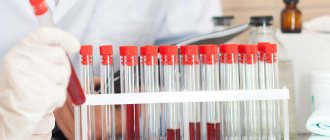In what cases can hCG levels increase in the absence of pregnancy?
- Multiple pregnancy.
- Prolonged pregnancy (post-term).
- Discrepancy between the actual and established gestational age (the gestational age is longer than that established before the study).
- Early toxicosis of pregnant women.
- Diabetes mellitus in the mother.
- Chromosomal pathology of the fetus.
Note. The hCG level when determining Down syndrome is elevated. But, this analysis is only one of the indicators of a risk group, so additional research is needed to make an accurate diagnosis. The risk of giving birth to a baby with Down syndrome is determined in the first trimester during the first mandatory screening at 11 to 13 weeks 6 days.
- Taking synthetic gestagens (progesterone - utrozhestan, duphaston).
In case of these suspicions, it is recommended to re-test after 48-72 hours to monitor the indicators over time.
In the normal state of the body of a non-pregnant woman, the level of hCG should be almost zero. The level of this hormone in the blood is within the normal range - from 0 to 5. If you are not pregnant, but a blood test shows a high level of hCG, this is most likely an error.
There are some factors that can cause an incorrect, erroneous test result. Therefore, talk about these nuances with your doctor and try to get tested again. Also try going to another clinic and getting tested there. To compare the results. But sometimes an increased level of hCG indicates some abnormalities in the female body.
You may be taking or have taken any medications
before analysis - medications tend to cause incorrect test results. Affects tests and intake of hormonal medications.
A recent abortion may also be the cause of such results. In this case, the hCG level simply has not yet returned to normal.
In some cases, the hormone hCG is produced in the brain. Namely, it is produced by the pituitary gland.
In addition, a disappointing reason for an increase in hCG levels in the body of a woman who is not pregnant is the presence of a tumor.
This hormone can also be produced in a woman’s body if she has entered menopause.
To find out the level of hCG, you need to take a blood test for this hormone. Biomaterial is taken from a peripheral vein in the arm for research. The content of human chorionic gonadotropin is determined by the enzyme immunoassay method. The test results are usually known the next day.
High hCG levels
An increase in hCG in men and non-pregnant women may indicate the development of malignancy.
For the most part, a high level of hCG is not a pathology during pregnancy; it can be a sign of multiple pregnancy, toxicosis, but when an increased level of the hormone is combined with other indicators, it can be a harbinger of gestosis or diabetes.
Increased hCG levels during hydatidiform mole - more than 100,000 mIU/ml with uterine enlargement and bleeding.
Increased hCG (choriogonadotropin) levels during hydatidiform mole - more than 100,000 mIU/ml with uterine enlargement and bleeding. This text is taken from /diseases/ginec/puzir_zanos
Increased hCG (choriogonadotropin) levels during hydatidiform mole - more than 100,000 mIU/ml with uterine enlargement and bleeding. This text is taken from /diseases/ginec/puzir_zanos
The combination of high hCG with low levels of AFP and estriol may indicate an increased risk of having a child with a genetic pathology.
How to take an hCG test correctly?
By donating blood for beta-hCG, you can confirm the presence of pregnancy as early as 6–10 days after embryo implantation (usually on day 11). During a normal pregnancy, hCG can be detected in the blood serum on the 5th day after implantation of the egg into the uterine mucosa and its peak lasts until 8-9 weeks of pregnancy.
If the approximate date of conception is not determined, then a blood test for hCG should be taken 3-5 days after a missed period. 3-4 weeks after the first day of the last menstruation.
HCG is the only objective test in the early stages, when ultrasound cannot yet clearly answer whether pregnancy has occurred or not.
Venous blood is used for analysis. It is taken in the area of the elbow bend. For this:
- A woman sits on a couch or chair.
- Either arm is exposed, so that the elbow is free of clothing.
- A tourniquet is applied above the elbow.
- You need to clench and unclench your fist several times.
- The nurse applies antiseptic to the desired area.
- He tries to get the needle into the vein and draw the syringe.
- Once the needle is in the right place, the tourniquet is removed to allow blood to circulate better.
- After collecting the required amount of blood, a cotton swab soaked in medical alcohol is applied to the puncture site and clamped.
- As soon as the blood stops coming out, you can lower the sleeve.
HCG and beta hCG - what is the difference?
Beta-hCG is a structural part of the human chorionic gonadotropin molecule. Let's consider the main indications for prescribing analysis for hCG and beta-hCG.
The need for research is determined by a general practitioner, gynecologist, endocrinologist, oncologist or urologist. Indications for use:
- the need to confirm pregnancy at an early stage;
- monitoring the course of pregnancy;
- conducting prenatal screenings to identify fetal malformations;
HCG analysis is also carried out for amenorrhea, suspected ectopic pregnancy, diagnosis of trophoblatic pathologies, etc.
For men, the study is carried out when signs of malignant neoplasms appear in the testicles.
The beta-hCG level is determined if a multiple pregnancy is suspected, as well as to monitor its normal course. In addition, the doctor will prescribe a test if there is a threat of miscarriage or spontaneous abortion. The study is mandatory to confirm a successful induced abortion and to establish the reasons for the absence of menstruation.
According to limited data, it is known that the value of beta-hCG increases in breast cancer. Therefore, it is determined when cancer is suspected.
Preparing for analysis
For the analysis data to be reliable, the patient must follow the following preparation rules:
- Stop eating 8-10 hours before the test.
- It is not recommended to drink water 6 hours before the test.
- You need to stop smoking 1.5-2 hours before taking the sample.
- You must refrain from drinking alcoholic beverages for two days before the test.
It is important to remember that hCG levels in non-pregnant patients can be affected by hormone intake. Therefore, 2 days before the test you need to stop using such drugs. If you cannot interrupt the course of treatment, you must inform your doctor about all medications you are taking.
Before going to the laboratory, you must not eat food the day before for 7-6 hours before the procedure. Do not drink the liquid for 3 hours. If a woman takes any medications, then she should inform the doctor about this.
When to take the test, which method is more accurate?
The presence of hCG can be determined by a blood or urine test. Urine testing is a qualitative reaction, that is, it determines only the presence of the hormone in the body. Based on this, they judge the presence or absence of a new life under the mother’s heart.
It is recommended to donate blood for pregnancy to obtain more detailed data. A blood test gives an idea of the exact concentration of the hormone in the blood - a quantitative reaction. Based on these studies, doctors not only determine whether conception has been successful, but can also monitor unwanted changes.
Using a blood test, you can determine that a woman is expecting a child already 10-12 days after conception. The level of the hormone in the urine is half as much, so the second line on the express test will appear 1-2 weeks after the delay.
When to take hCG test for pregnancy? You can donate blood for hCG as early as 1-2 days of delay or on the 14th day after fertilization (when the woman knows the date of conception).
To identify disorders in the development of the baby, blood must be taken from the 16th to the 20th week as part of a comprehensive examination - a triple test.
For analysis, blood is taken from a vein. Definitely on an empty stomach. Usually the analysis is taken in the morning, but it can be done later if the woman does not eat for 4-6 hours before. It is advisable to repeat the study after 2-3 days. To track changes in hormone levels as accurately as possible, it is recommended to carry out tests in the same laboratory, at the same time, under the same conditions. It is necessary to exclude physical activity during the day, which can affect the performance. It is also important to tell your doctor (laborator) if you are taking hormonal medications.
Important! The gestational age according to hCG usually does not coincide with the one determined by the doctor. The hCG level corresponds to the age of the unborn child from the day of conception. The obstetric period is calculated according to the date of the last menstruation (with a margin), which technically cannot be the day of conception. The difference between the obstetric and hCG dates can be from 1 to 3 weeks.
How does hCG rise during pregnancy?
The biological role of hCG is to maintain the function of the corpus luteum, as well as to prevent the secretion of progesterone in early pregnancy. Serum and urinary concentrations of total hCG increase during pregnancy, doubling within approximately 40–48 hours, reaching a maximum at 8–12 weeks. Starting from 10–12 weeks of pregnancy, it drops to 1/5–1/20 of maximum concentrations, after which a plateau occurs.
With a successfully developing pregnancy, the hCG level gradually increases, up to 10-12 weeks. Then, due to the fading of the function of the corpus luteum, it will begin to decline.
This process is individual for each woman, so we can only talk about generalized results.
In most cases, the hCG level is:
- Up to 4 weeks, doubles every 1-3 days;
- From 4 to 9 weeks it doubles every 3.5 days;
- After 10-12 weeks it drops, which is associated with fading of the function of the corpus luteum.
If hCG does not increase or decreases, you should consult a doctor, you can assume a frozen pregnancy. If hCG rises too quickly, one can assume the development of some disease, for example, hydatidiform mole.
Can hCG increase due to hormonal imbalance?
hCG (human chorionic gonadotropin)
Prevalence:
Unlike other glycoprotein hormones produced in the adenohypophysis, hCG is secreted by trophoblastic cells of the placenta during pregnancy and stimulates the development of the corpus luteum.
In the blood and urine there are both intact molecules and their free alpha and beta subunits, as well as the breakdown products of the beta core subunit. Only intact hCG molecules are biologically active.
For tumor diagnosis, the determination of the beta subunit (beta-hCG) is more specific.
Physiological function:
During pregnancy, hCG serves to maintain the fetus's immunotolerance to the mother's immune system.
Biological half-life: 1.5-2.5 days.
Elevated levels in patients with malignant diseases:
- tumors of trophoblastic or terminal origin
- testicular cancer
- ovarian cancer
- chorionic carcinoma
- hydatidiform mole
- stomach cancer (no independent significance)
- liver cancer (no independent significance)
- small intestine cancer (no independent significance)
- colon cancer (no independent significance)
- kidney cancer (no independent significance)
- small cell bronchogenic lung cancer (ectopic secretion)
- breast cancer (ectopic secretion)
- uterine cancer (no independent significance)
Increased rates in diseases of benign etiology:
- physiologically during pregnancy
- in menopausal women with fibroids or ovarian cysts
Indications for the study:
- diagnosis of hydatidiform mole and chorionic carcinoma
- control of chorionic carcinoma treatment
- diagnosis of tumors of terminal origin
- diagnosis and control of treatment of seminomas
Material for research:
- serum (plasma)
- amniotic fluid
- urine
- cerebrospinal fluid
Physiological function:
What to do if the readings are high
The normal level of hCG in non-pregnant women is considered to be from 0 to 5 mU/ml. If the hormone concentration exceeds the reference values, this may be a sign of serious pathologies. However, false test results cannot be ruled out if the patient violated the rules for preparing for the study. If you have doubts about the reliability of the analysis data, it is recommended to retake the sample.
There is no lower limit for hCG normal. If a woman is not pregnant, then she may completely lack this hormone. A zero value of human chorionic gonadotropin does not indicate pathology in this case. Only an increase in the concentration of the hormone is considered a deviation from the norm.
However, during pregnancy, a decrease in hCG is a rather dangerous sign. This hormone is necessary for the normal formation of the placenta and embryo development.
If the analysis showed hCG above normal, then it is not recommended to panic. It is necessary to undergo a more thorough diagnosis. After all tests show elevated levels and additional studies confirm the diagnosis, the doctor will develop a treatment strategy for the disease that can cope with high hCG.
Human chorionic gonadotropin is a necessary hormone when carrying a baby. It is needed to prevent the immune system from getting rid of the fetus prematurely. This hormone suppresses the activity of the immune system. However, in the absence of pregnancy, the very presence of hCG indicates serious problems that need to be resolved as quickly as possible.
Hormonal imbalance or pregnancy: similar and different symptoms
The first thing that catches your eye is the dramatic weight loss of the fair sex. At the same time, a lady can consume food in immoderate quantities, eating, as people say, for two. Often, ladies take an excessive appetite as a sign of pregnancy. But you need to think logically. In the first month, the fetus becomes established and develops slowly. He does not need as many nutrients as in the second and third trimesters. Therefore, if you constantly feel hungry, eat a lot, but are losing weight, go to the doctor immediately.
A completely opposite effect can also be observed, when a woman eats practically nothing, but at the same time gains a lot of weight. This is often accompanied by constipation, poor skin condition (dryness, acne), general weakness, and hair problems. People say that if a woman looks ugly, it means she is pregnant. But do not forget that an excess or lack of hormones leads to exactly the same consequences.
The second sign of hormonal imbalance is a fever that lasts more than a week. In this case, problems with the functioning of the heart, rapid pulse, excessive sweating, even if the woman is in a cool room, and increased nervousness may also occur. Unfortunately, some symptoms are also inherent in pregnancy. This is especially true for nervousness and sleep problems. Ladies who are pregnant often sleep poorly at night and feel slightly drowsy throughout the day.
The next thing that happens when there is a failure is sexual dysfunction. Women do not want intimacy, it is more difficult for them to become aroused, and they do not achieve orgasm. But during pregnancy in the first months, the libido of the fair sex does not deteriorate.
Another difference that helps determine whether a woman is pregnant or has a hormonal imbalance is the presence of bulging eyes. If a woman is pregnant, she does not have such an anomaly. But in the second case, the patient looks as if she is constantly surprised by something: her eyes are wide open, an unnatural shine is visible (as at a high temperature), the whites protrude a little forward.
Lack of menstruation is the very first sign of pregnancy. All women of childbearing age know this. But, unfortunately, even if there are health problems, a delay may occur. Moreover, the problem may lie not only in hormonal imbalance, but also in some female diseases (infections, tumors, etc.). Therefore, you should not rely on this symptom either.
Plus, in both cases, hair on the body may begin to grow, age spots, stretch marks on the skin may appear, appearance will deteriorate, and problems with vision, skin, and teeth may begin. Sometimes women experience headaches, nausea, dizziness, and increased urination. Is this pregnancy? You can rely on the listed signs, but if they did not appear the next day after the delay, but after at least three weeks.
Thus, as you can see, the symptoms of pregnancy and hormonal imbalance are almost the same. But there are also differences that will help you figure out what you have. But still, you shouldn’t play doctor, guess on the coffee grounds, buy tons of pharmacy tests and wait for the belly to appear. This may not happen, and the problem that caused the boom will become more serious. And then you will have to undergo treatment for more than one month.
Indications for determining hCG during pregnancy
HCG determination is especially useful in detecting pregnancy 1-2 weeks after conception, as well as for diagnosing and monitoring tumors.
In an ectopic pregnancy, serum hCG levels are lower than in a normal pregnancy at the same time. Therefore, the analysis makes it possible to distinguish menstrual irregularities from real pregnancy.
A reduced concentration of the hormone is also observed in cases of threatened miscarriage, undeveloped pregnancy, as well as intrauterine fetal death in the early stages.
The combined determination of hCG, free estriol and AFP in the second trimester of pregnancy (the “triple test”) is valuable, along with other maternal clinical data, in assessing the risk of fetal chromosomal abnormalities at birth.
- Pregnancy marker: early diagnosis of pregnancy, determination of gestational age (especially during IVF);
- Pregnancy monitoring (threatened miscarriage, non-developing pregnancy);
- Diagnosis of ectopic (ectopic) pregnancy;
- Prenatal diagnosis (part of the “triple test” together with AFP and free estriol, and if you add ultrasound data - PRISCA II).
Decoding hCG
This table shows the dates by week from CONCEPTION. If you calculate hCG by obstetric weeks (from the date of the last menstruation), then add 2 weeks.
- At 1-2 weeks it is up to 300IU,
- At 3 weeks – up to 5000IU,
- At 4 weeks up to 30,000IU,
- At 5 weeks – 100,000 IU,
- At 6 weeks – 150,000 IU,
- At 7 weeks up to 200,000 IU,
- At 10 weeks 150-200000IU,
- At 12 weeks - about 90,000IU,
- At 14 weeks – 60,000 IU,
- At 25 – 40000 IU,
- At 35 weeks – 40,000-60,000IU.
Reasons for a false positive result
Why is hCG elevated in non-pregnant patients? Human chorionic gonadotropin levels can be affected by taking hormonal medications, as well as a recent abortion or miscarriage. Such reasons are non-pathological, since the increase in hormone levels is reversible.
However, often a high concentration of hCG indicates dangerous pathologies:
- malignant tumors;
- hydatidiform mole;
- chorionic carcinoma.
Next, we will consider in detail the possible reasons for the increase in chorionic hormone.
In a situation of false positive testing, the hormone, which is normally produced during pregnancy, is present in the woman’s body for other reasons that are associated with serious diseases: malignancies, cysts or tumors. In this case, hCG is produced by tumor cells.
According to WHO statistics, a hormone level of up to 1000 mIU/ml indicates a low risk of having a tumor in the body. If the level is higher and there is no pregnancy, the woman is referred for additional examination to identify the exact cause of the false-positive test.
Benign diseases that provoke an increase in hCG:
- ulcerative formation of the stomach and duodenum;
- inflammation of the gastrointestinal tract;
- some liver diseases.
Malignant formations that affect hCG levels:
- tumors of internal organs;
- cancer of the lungs, stomach or pancreas.
Treatment with hormonal drugs provokes an increase in hCG in the blood and urine, which also affects the analysis. During infertility treatment, women are prescribed hormonal pills or injections containing hCG. It is prohibited to conduct tests at this time - the answer will be false positive.
Hormonal treatment may cause a false test
Gonadotropin reacts with the dye on the test strip, so its presence in the urine is always reflected by a positive answer. After a miscarriage or abortion, its concentration in the blood does not decrease for several weeks - tests at this time are also false positive. Sometimes taking psychotropic drugs causes a sharp increase in the hormone in the blood.
Hydatidiform mole also gives a positive pregnancy test. The disease is associated with pregnancy and is rare. During fetal development, the upper layer that precedes the placenta (chorion) grows, and cystic-type expansions appear on it, resembling air bubbles. The disease cannot be treated, so the pregnancy is terminated surgically. Within two months after treatment, hCG in the blood and urine does not decrease, and the second strip is colored on the test.
After childbirth, the concentration of the hormone gradually decreases over 60 days, so during this time the woman may also see two false stripes.
The cause of a false test is sometimes a hormonal imbalance. A woman’s body produces hormones that are similar in structure to hCG, their increased levels can affect the final result - the test gives a positive answer, but there are no symptoms of pregnancy.
Sometimes the test determines pregnancy during menopause - the woman’s body produces a small amount of hCG during this period. In case of hormonal imbalance and emotional outburst, the result turns out to be false positive.
It should be noted that false positive responses are less common than false negative ones. In addition to the high concentration of human chorionic gonadotropin in the urine, there are additional reasons why the test is wrong:
- Low production quality.
- Improper storage, damage during transportation.
- Expired date.
- Incorrect use of the test, failure to follow instructions.
- Chorionic carcinoma, recurrence of chorionic carcinoma.
- Hydatidiform mole, relapse of hydatidiform mole.
- Seminoma.
- Testicular teratoma.
- Neoplasms of the gastrointestinal tract (including colorectal cancer).
- Neoplasms of the lungs, kidneys, uterus, etc.
- The study was conducted within 4–5 days after the abortion.
- Taking hCG drugs.
HCG: blood test
This analysis is prescribed if it is necessary to establish the presence of human chorionic gonadotropin in a woman’s body, as well as to determine its concentration. The study allows you to diagnose the presence of pregnancy, identify possible deviations in the development of the fetus, as well as its various diseases, incl. oncopathology.
The amount of the hormone in most cases makes it clear about possible birth defects of the unborn child. For this purpose, maternal serum is collected for biochemical screening. As a rule, the study is scheduled at 15-18 weeks, when it is necessary to check at least 3-4 hormones of the expectant mother (they reflect the condition of the fetus).
If triple screening is performed, the levels of estrogen, hCG and AFP (α-fetoprotein) are examined. When prescribing quadri-screening, in addition to the hormones described above, a study of the peptide, namely inhibin A, is added. Thanks to this diagnosis, it is possible to identify possible complications during pregnancy, as well as to suggest congenital pathologies of the fetus (but with a certain degree of probability). It is not uncommon for such studies to be prescribed to detect Down syndrome, Patau and Edwards syndrome in the fetus.
To increase the accuracy of diagnosing genetic pathology, special automated programs are used, created by scientists based on a large sample. To obtain a result with the maximum degree of probability, it is necessary to know not only the levels of these hormones, but also some indicators of the fetus measured using an ultrasound machine (thickness of the collar space, length of the nasal bones, etc.). Therefore, biochemical screening is carried out almost 1-2 days before ultrasound fetometry.
Urine can be used to determine the level of human chorionic gonadotropin in a woman's body. However, many experts note that the most accurate results are reflected by a blood test, 98-99%. The popularity of determining the hormone in urine is associated with special tests that can be bought at a pharmacy and used at home, but their diagnostic accuracy will be lower than that of the laboratory method.
Taking medications
HCG levels in non-pregnant patients may be elevated due to medications. False test results are most often observed during a course of treatment with hormonal drugs containing human chorionic gonadotropin. These include:
- “Horiogonin”.
- “Profasi.”
- “Horagon.”
- “Rotten.”
- “Chorionic gonadotropin.”
These medications are most often prescribed by injection. They are used to treat menstrual disorders, infertility, and also in preparation for IVF.
For this reason, doctors recommend stopping the use of hormones a few days before the test. However, these drugs are often prescribed according to a special regimen, and the course of treatment cannot be interrupted. In such cases, it is necessary to take a test after completing hormonal therapy. When taking such medications, the study in most cases gives unreliable results.
Nowadays, some women use hCG drugs to build muscle mass. This can also cause false test results. Doctors categorically prohibit the use of hormonal drugs for sports purposes. This can provoke serious endocrine disorders, and even the development of tumors.
Abortion
HCG levels in non-pregnant women may be elevated after an abortion or miscarriage. This is due to the fact that the hormone produced by the fetal membrane remains in the patient’s blood after termination of pregnancy. It takes a while for his numbers to return to normal.
After an abortion, hCG levels return to normal very slowly. Artificial termination of pregnancy is a great stress for the body. In the first 5-7 days, the concentration of the hormone may even increase. Then the levels of human chorionic gonadotropin begin to gradually decrease. The hCG level is completely normalized only 5-6 weeks after the abortion.
There are cases when, a week after artificial termination of pregnancy, the concentration of the hormone continues to increase. This is a pretty alarming sign. It may indicate that chorion particles remain in the uterine cavity. In this case, the patient needs to undergo endometrial curettage.
If there is an early miscarriage, the hCG concentration remains elevated for a week. Then the hormone level is completely normalized. If spontaneous abortion occurs in the second or third trimester, the recovery period takes about 1 month.
Reasons for a false positive pregnancy test: why they might be lying
The most common reason for a false-positive pregnancy test is that it is defective or expired. If you visit the sites of planning women, you can see entire galleries of photographs with false positive results. There are even communities that make fun of the Russian brand “Bi-Shur”, which, according to the observations of those dreaming of a child, always lies (in particular, defining pregnancy where it cannot even theoretically exist).
In addition, the study of this hormone will help determine whether there is a risk of various abnormalities in the formation of the fetus. A common pregnancy test is to determine the level of the hormone in the urine. But with its help it is impossible to determine the exact timing in comparison with the study of hCG in the blood.
Malignant tumors
The cause of high hCG levels in non-pregnant patients may be malignant neoplasms. This hormone is a kind of tumor marker. An increased concentration of human chorionic gonadotropin is observed in germ cell tumors. These neoplasms are localized in the ovaries or mediastinum. They are formed from primary cells that are formed during the prenatal period.
HCG in non-pregnant patients may also increase with malignant tumors in the following organs:
- rectum and colon;
- kidneys;
- lungs;
- uterus.
An increase in the concentration of human chorionic gonadotropin is not always a sign of dangerous neoplasms. However, the patient should be tested for tumor markers and undergo a series of instrumental examinations.
Hydatidiform mole and choriocarcinoma
These diseases can be attributed to the abnormal course of pregnancy. However, with these pathologies, the embryo does not develop in the uterus, but dangerous tumors form from chorion cells. Therefore, women do not feel any signs of pregnancy.
The cause of hydatidiform mole is a chromosomal malfunction during the fertilization process. After the fusion of the sperm and the egg, the chorionic villi begin to grow and turn into vesicles with liquid. The fetus either does not develop or dies immediately. Pathologically overgrown chorion particles produce an increased amount of hCG.
This dangerous pathology is accompanied by severe uterine bleeding. Discharge from the genital tract mixed with bubbles is observed. The patient needs emergency surgery. However, hCG levels in non-pregnant women may remain elevated even after removal of the hydatidiform mole.
Chorionic carcinoma is a malignant neoplasm that is formed from cells of the fetal membrane. In this case, the embryo in the uterus does not develop or dies. The tumor can grow beyond the reproductive organs and metastasize to the lungs. Her cells constantly produce the hormone hCG.
The patient is bothered by abdominal pain and spotting that does not respond to conventional therapy. In the early stages, chorionic carcinoma is subject to conservative treatment with antitumor chemotherapy.
Why does hormonal imbalance occur?
First you need to determine why this happened to you. Agree, it is easier to eliminate the cause once than to constantly deal with the consequences later. So, there are several factors that could influence the occurrence of hormonal imbalance. Among them are:
Very often, a hormonal imbalance occurs in the body of a representative of the fair sex after infection and treatment of infectious diseases. This could be chlamydia, thrush, cystitis, trichomoniasis, syphilis, and so on on the list. By the way, if you have recently encountered similar diseases, it is better not to plan children at all for the first six months. First, we get treatment, get tested, and then have a child.
Most often this happens in the autumn-winter period, when the lack of vitamins and nutrients is especially felt by our body, which is weakened by frost, cold and rain. Acute respiratory infections, influenza, ARVI, etc. could also provoke the problem.
Whether it is a malignant or benign tumor, its presence still negatively affects our health. The body seems to be trying to send a signal that something is wrong. Therefore, if you do experience a hormonal imbalance, the first thing you should do is get a full examination at the clinic.
Please note: recently, representatives of the fair sex are increasingly faced with cysts and breast cancer, polycystic ovary syndrome, uterine fibroids and other female diseases. That is why you should not neglect visits to the gynecologist. You should visit a specialist at least once a quarter. Young girls need to visit a mammologist once a year. Ladies who are well over 30 will have to constantly undergo examination using a special device that detects tumors in the breast.
In the early stages, it is possible to remove the tumor, but if you wait until the last minute, it will not end well. In advanced cases, even chemotherapy will not help. Unfortunately, in our time we have not yet learned how to stop the development of cancerous tumors. And even if the girl undergoes full treatment, she may have a relapse in the future.
- Problems with the endocrine system
If the endocrine system ceases to function normally, serious changes may begin in the body of the fair sex. All this can end sadly, even in death. That’s why it’s so important not to let the disease get worse. Problems should be sought in the functioning of the adrenal glands, thyroid and pancreas.
If you have recently undergone surgery, even a minor one, you may feel unwell at first. A certain amount of time must pass until the hormonal levels return to normal. But still, if the symptoms are too obvious, it is better to consult a specialist.
So the woman became pregnant. Changes began to occur in her body, the body is preparing for a long period of bearing a baby. A special hormone is released that is responsible for the development of the fetus. And then the lady decides to artificially terminate the pregnancy, that is, to have an abortion. The embryo is no longer there, but for some time the body continues to work in the same direction. The result is hormonal imbalance.
After such interventions, long-term treatment should be undertaken. Plus, don’t forget to get tested to eliminate the risk of infection or the development of any pathologies. Even after a year, diseases resulting from this operation may appear, so it is still better to think first and weigh the pros and cons.
On sale in pharmacies you can find drugs that are popularly called first aid for a broken condom. If you take a pill within the first 48 (12, 24) hours, you will not be afraid of an unplanned pregnancy. In fact, you shouldn’t play with such “wonderful” medicines, as it is dangerous to your health.
Even after one time, serious consequences can occur, including infertility. And some representatives of the fair sex experiment almost every month. And then they wonder why they can't have children. By the way, some time after taking the pill you will really feel bad: nausea, vomiting, dizziness will begin, and you will lose your appetite. Some ladies even faint.
Interesting: Is It Possible to Feed a Baby Breast Milk After a Caesarean?
A woman should not drink beer. And period. And not just because it contains alcohol. Daily consumption of this drink leads to serious consequences. Ladies begin to grow mustaches, body hair, and shoulders become broad, like men's. Review your diet. And if there are too many products containing phytohormones, try to give them up at least for a while.
Unfortunately, we take not only the best from our parents. Most of the diseases that our mothers and fathers had are passed on to their children. Therefore, if your mother also experienced similar disorders and anomalies, immediately report this to your doctor. In this case, you will have to be under constant supervision of specialists.
All diseases come from nerves. Try to remember if there was something the day before that made you very worried, nervous, or worried. These can be both negative and positive emotions. An upcoming conference, illness of relatives, a marriage proposal - all this could lead to hormonal imbalance.
Reasons for a false positive result
The appearance of two stripes in certain situations is possible even in the absence of pregnancy. This is called a false positive response.
During pregnancy, the female body produces a special hormone called hCG - human chorionic gonadotropin. By the concentration of the hormone, you can determine pregnancy and its duration.
Each test is based on the principle of an active reaction: a special reagent reacts with the hCG hormone and colors the second line on the test strip. A sharp increase in hormone levels is observed in the first weeks of pregnancy and indicates the development of the protective membrane of the fetus - the placenta. One hundred percent accuracy of the test is possible after only 7 days of delay, since the amount of the hormone increases every day.
Of course, as in any other testing situation, there is a small risk of getting incorrect results. If the tests are ambiguous, it is recommended to take the hCG test again in the same laboratory at intervals of several days (48-72 hours). During pregnancy, the result will be 1.5 - 2 times higher than in the first case. If there is no pregnancy, then its indicators will remain or increase.
The most common reasons for false-negative results, when hCG is not detected during pregnancy, include:
- Poor quality blood sampling.
- Untimely (too early) test.
- A woman has late ovulation or implantation of the fertilized egg in the uterus.
- Ectopic pregnancy.
False-positive hCG results, when the indicator rises and the woman is not pregnant, are extremely rare. HCG may increase if women suffer from serious diseases (breast, ovarian, stomach, and other manifestations of oncology).
If a woman sees any changes in the level of hCG, she should immediately consult an obstetrician-gynecologist to clarify this situation and receive recommendations.
HCG levels are not affected by taking contraceptives or any other drugs except those that contain this hormone and are prescribed in the process of infertility treatment.
For up to 6 weeks, pregnancy is diagnosed only by the level of hCG; if it does not increase or decreases, it can be assumed that the pregnancy was interrupted (miscarriage) or froze. Ultrasound can provide similar findings much later.
If a miscarriage occurs, hCG in the blood remains elevated for several days. Then it gradually decreases and reaches the “pre-pregnancy” level after 4-6 weeks.
We would like to thank gynecologist Kristina Povarova for her assistance in preparing this article.
User comments
HCG (human chorionic gonadotropin)
Prevalence:
Unlike other glycoprotein hormones produced in the adenohypophysis, hCG is secreted by trophoblastic cells of the placenta during pregnancy and stimulates the development of the corpus luteum.
In the blood and urine there are both intact molecules and their free alpha and beta subunits, as well as the breakdown products of the beta core subunit. Only intact hCG molecules are biologically active.
For tumor diagnosis, the determination of the beta subunit (beta-hCG) is more specific.
Physiological function:
During pregnancy, hCG serves to maintain the fetus's immunotolerance to the mother's immune system.
Biological half-life: 1.5-2.5 days.
Elevated levels in patients with malignant diseases:
- tumors of trophoblastic or terminal origin
- testicular cancer
- ovarian cancer
- chorionic carcinoma
- hydatidiform mole
- stomach cancer (no independent significance)
- liver cancer (no independent significance)
- small intestine cancer (no independent significance)
- colon cancer (no independent significance)
- kidney cancer (no independent significance)
- small cell bronchogenic lung cancer (ectopic secretion)
- breast cancer (ectopic secretion)
- uterine cancer (no independent significance)
Increased rates in diseases of benign etiology:
- physiologically during pregnancy
- in menopausal women with fibroids or ovarian cysts
Indications for the study:
- diagnosis of hydatidiform mole and chorionic carcinoma
- control of chorionic carcinoma treatment
- diagnosis of tumors of terminal origin
- diagnosis and control of treatment of seminomas
Material for research:
- serum (plasma)
- amniotic fluid
- urine
- cerebrospinal fluid
Material for research:











